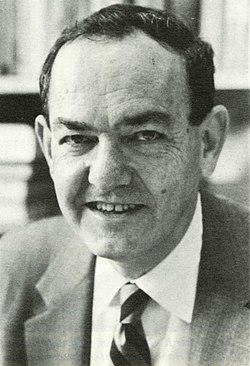Portal:Systems science
The systems science portal
 |
| Complex systems approach |
Systems science is an transdisciplinary[1] field that studies the nature of systems—from simple to complex—in nature, society, cognition, engineering, technology and science itself. To systems scientists, the world can be understood as a system of systems. The field aims to develop interdisciplinary foundations that are applicable in a variety of areas, such as psychology, biology, medicine, communication, business management, engineering, and social sciences.
Systems science covers formal sciences such as complex systems, cybernetics, dynamical systems theory, information theory, linguistics or systems theory. It has applications in the field of the natural and social sciences and engineering, such as control theory, operations research, social systems theory, systems biology, system dynamics, human factors, systems ecology, systems engineering and systems psychology. Themes commonly stressed in system science are (a) holistic view, (b) interaction between a system and its embedding environment, and (c) complex (often subtle) trajectories of dynamic behavior that sometimes are stable (and thus reinforcing), while at various 'boundary conditions' can become wildly unstable (and thus destructive). Concerns about Earth-scale biosphere/geosphere dynamics is an example of the nature of problems to which systems science seeks to contribute meaningful insights.
Selected article -
An economic system, or economic order, is a system of production, resource allocation and distribution of goods and services within a economy. It includes the combination of the various institutions, agencies, entities, decision-making processes, and patterns of consumption that comprise the economic structure of a given community.
An economic system is a type of social system. The mode of production is a related concept. All economic systems must confront and solve the four fundamental economic problems:
- What kinds and quantities of goods shall be produced: This fundamental economic problem is anchored on the theory of pricing. The theory of pricing, in this context, has to do with the economic decision-making between the production of capital goods and consumer goods in the economy in the face of scarce resources. In this regard, the critical evaluation of the needs of the society based on population distribution in terms of age, sex, occupation, and geography is very pertinent.
- How goods shall be produced: The fundamental problem of how goods shall be produced is largely hinged on the least-cost method of production to be adopted as gainfully peculiar to the economically decided goods and services to be produced. On a broad note, the possible production method includes labor-intensive and capital-intensive methods.
- How the output will be distributed: Production is said to be completed when the goods get to the final consumers. This fundamental problem clogs in the wheel of the chain of economic resources distributions can reduce to the barest minimum and optimize consumers' satisfaction.
- When to produce: Consumer satisfaction is partly a function of seasonal analysis as the forces of demand and supply have a lot to do with time. This fundamental economic problem requires an intensive study of time dynamics and seasonal variation vis-a-vis the satisfaction of consumers' needs. It is noteworthy to state that solutions to these fundamental problems can be determined by the type of economic system. (Full article...)
Selected picture

An ecological analysis of CO-2 in an ecosystem. As systems biology, systems ecology seeks a holistic view of the interactions and transactions within and between biological and ecological systems.
'WikiProjects
Selected biography -
Herbert Alexander Simon (June 15, 1916 – February 9, 2001) was an American scholar whose work influenced the fields of computer science, economics, and cognitive psychology. His primary research interest was decision-making within organizations and he is best known for the theories of "bounded rationality" and "satisficing". He received the Turing Award in 1975 and the Nobel Memorial Prize in Economic Sciences in 1978. His research was noted for its interdisciplinary nature, spanning the fields of cognitive science, computer science, public administration, management, and political science. He was at Carnegie Mellon University for most of his career, from 1949 to 2001, where he helped found the Carnegie Mellon School of Computer Science, one of the first such departments in the world.
Notably, Simon was among the pioneers of several modern-day scientific domains such as artificial intelligence, information processing, decision-making, problem-solving, organization theory, and complex systems. He was among the earliest to analyze the architecture of complexity and to propose a preferential attachment mechanism to explain power law distributions. (Full article...)
Did you know
- ... that the Yugoslavian Mihajlo D. Mesarovic in 1970s wanted to provide a unified and formalized mathematical approach to all major systems concepts.
- ... * and next a science of action, called "Interactive management".
- ... that a successful experimental system must be stable and reproducible enough for scientists to make sense of the system's behavior, but unpredictable enough that it can produce useful results?
- ... that self-organization is a process of attraction and repulsion in which the internal organization of a system, normally an open system, increases in complexity without being guided or managed by an outside source?
Categories
Related portals
Topics
Tasks
 |
Here are some tasks awaiting attention:
|
Associated Wikimedia
-

-

-

-

-
Random portal









